History

















Management
One of the main developments during this period was the establishment of the RCA Regional Office (RCARO) in the Republic of Korea. As a follow-up to the recommendation made by the Working Group on RCA management in 1997 to station a senior RCA representative in the region, a proposal to establish an RCA Regional Office in the Republic of Korea was submitted by the Republic of Korea for the consideration of the 29th RCA General Conference Meeting (RCA GCM) held in September 2000.
Following discussions at the 23rd Regional Meeting of the RCA National Representatives (RCA NRM) held in March 2001 in Bangladesh and at the 30th RCA GCM held in September 2001, the RCA GPs agreed in principle to the proposal to establish a Regional Office in the Republic of Korea, taking into consideration the recommendations of the Working Group appointed to review the proposal. The Regional Office was opened in March 2002 during the 24th RCA NRM held in the Republic of Korea. Dr. Jin-Kyoung Kim was the first Director of the RCARO.
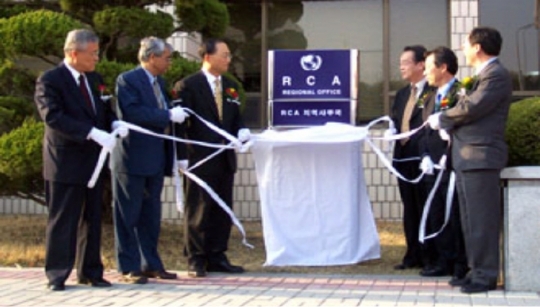
The status of the RCARO was formalized through a resolution adopted at the 32nd RCA GCM held in 2003. The functions of the RCARO were identified as, a) pro-actively seeking out opportunities for the RCA to participate in projects being formulated and designed by major regional and international donors, b) negotiating and securing funding for RCA projects, c) promoting the peaceful uses of appropriate nuclear technology to assist in addressing regional and national needs, and, d) enhancing the visibility of the RCA at regional and national fora.
Subsequently, assisting the IAEA in the performance of its secretariat duties (Article VII of the Agreement of 1987), assisting the RCA Chair in carrying out his/her responsibilities, and assisting the implementation of projects and project activities were added as additional functions of the RCARO. RCARO has entered into a Practical Arrangement with the IAEA regarding secretariat duties.
All the operational costs of the RCARO have been borne by the Government of the Republic of Korea, the host country of the RCARO.
An advisory committee (RCARO Standing Advisory Committee – RCARO SAC), comprising the current RCA Chair, the previous RCA Chair, the next RCA Chair, the RCA National Representative of the Republic of Korea, and the RCA Coordinator was formed to advise the RCARO on operational matters, to review its work plans and to monitor the progress of their implementation. The RCARO SAC meets twice a year prior to the annual RCA NRMs and RCA GCMs.
Since its establishment, the RCARO has made a very significant contribution to RCA by numerous means. Some of the notable contributions made over the past 20 years are the establishment and management of the RCA website (www.rcaro.org), establishment of partnerships with several regional organizations including UNDP, UNOSSC, publication of RCA Success Stories and RCA brochures, representing RCA at international fora, and funding and managing the RCARO managed projects including the RCA Research Project. A detailed description of all the contributions of the RCARO is beyond the scope of this document.
Another notable development during this period was the Strategic Session held during the 26th RCA NRM held in 2004 in Pakistan, under the topics of a) formulation of an RCA Medium-Term Strategy b) procedure for the formulation of new RCA projects c) appointment and roles and responsibilities of RCA stakeholders and d) format of the RCA Annual Report. The recommendations of the Strategic Session on the above topics were incorporated in the RCA Guidelines and Operating Rules. [16] Criteria for RCA Projects, a revised procedure and timeframe for development of RCA projects, the appointment of National Project Teams and adoption of National Work Plans, and a revised format of the RCA Annual Report aimed at improving the visibility of the RCA, were some of the outcomes of this Strategic Session.
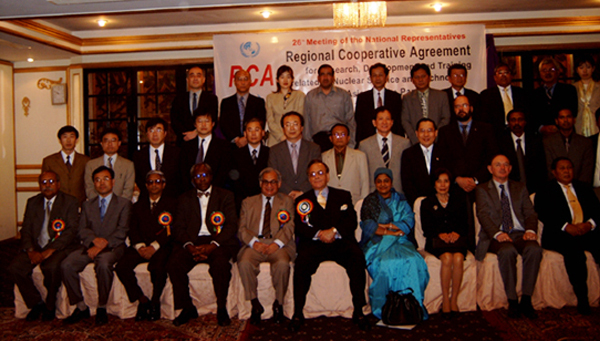
As a follow-up to one of the recommendations of the Strategic Session held during the 26th RCA NRM, a Working Group comprising RCA National Representatives of Australia, New Zealand, India, Malaysia, and the Philippines was appointed to draft a Medium-Term Strategy for the RCA by the 27th RCA NRM held in 2005 in Malaysia. The report of the Working Group, which was chaired by the RCA National Representative of Australia, Dr. Ronald Cameron, containing the RCA Medium-Term Strategy for 2006-2011, was adopted at the 28th RCA NRM held in 2006 in Thailand. The 28th RCA NRM also recognized the need to identify RCA strategic priorities.
The RCA Medium-Term Strategy (RCA MTS) for 2006-2011 was subsequently extended to 2012-2017 by a Working Group comprising RCA National Representatives/nominees of Australia, China, India, Indonesia, Japan, Malaysia, New Zealand, and Pakistan. The report of the Working Group, which was also chaired by Dr. Ron Cameron of Australia, was adopted at the 38th RCA GCM held in 2009. The RCA MTS for 2012-2017 contained an updated version of the MTS for 2006-2011 and an Implementation Plan.
The Working Group appointed to extend the RCA MTS to 2012-2017 also recommended identification of RCA Strategic Priorities for this period. The procedure recommended by the Working Group, namely, a) conducting a survey to determine the needs and priorities of the RCA Government Parties, b) developing a Regional Profile, and c) forming Working Groups in each Thematic Area, was approved by the 38th RCA GCM.
Following the decision of the 38th RCA GCM, the RCA Regional Profile was drafted by former RCA Coordinator Dr. John Easey of Australia. It contained the outcomes of the survey conducted to identify the needs and the priorities of the RCA Government Parties and an analysis of the past RCA Projects. [13]. The Working Groups comprising experts in each Thematic Area and chaired by an RCA National Representative met on 22-26 February 2010 at the IAEA headquarters in Vienna. The report containing the RCA Strategic Priorities for 2012-2017, prepared based on the recommendations of the respective Working Groups, was adopted at the 32nd RCA NRM held in the Philippines in 2010 [18,19] and was used in identifying the priority areas for the RCA projects during this period (2012-2017).
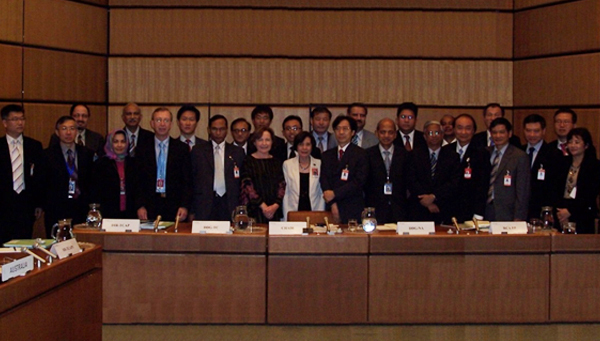
The restructuring of the Department of Technical Cooperation of the IAEA in 2006 had an impact on RCA and other Regional Agreements. The IAEA Secretariats of the Regional Agreements were brought under the direct supervision of the Directors of the relevant regional divisions and Focal Persons were appointed to assist the Directors, replacing the Coordinators of the Regional Agreements. The RCA Coordinator, Dr. Prinath Dias continued to serve the RCA under the new designation of RCA Focal Person. Another change that impacted RCA was the amalgamation of former East Asia and West Asia Sections under the Director for the Division for Asia and the Pacific (DIR-TCAP), which increased the number of IAEA Member States participating in non-agreement regional TC projects managed by this Division. Before the amalgamation, RCA functioned under the East Asia and the Pacific Section of the Division for Asia and Africa (TCPA).
The Regional Cooperative Agreement of 1987 was extended to another 5 years in 2002 and in 2007.
View All Management30th Anniversary of the RCA
A Scientific Forum was held during the 24th RCA NRM held in the Republic of Korea in 2002, to celebrate and in recognition of the 30th Anniversary of the RCA. Presentations were made on ‘The Legend of the RCA’ by Mr. A.K. Anand (IND), ‘Serving for Human Needs’ by Prof. Naiyyum Choudhury (BGD), ‘New Challenges with Nuclear Techniques’ by Dr. Sueo Machi (JPN), ‘For a Better Partnership’ by Dr. John Easey (AUL), and ‘Toward a Viable Economic Development’ by Prof. Byong-Whi Lee (ROK).
Government Parties
The RCA membership remained at 17 Government Parties during this period. Palau and Nepal, which became Member States of the IAEA in 2007 and 2008 respectively, were invited to join the RCA.
Projects
Forty eight RCA Projects implemented under the Technical Cooperation Programme of the IAEA were initiated during this period, comprising 5 projects on agriculture, 10 on environment, 3 on energy planning, 10 on human health, and 11 projects on industry. There were also 4 projects on radiation protection, 3 on research reactors, and 2 on development of TCDC.
The agricultural projects were on food irradiation (sanitary and phytosanitary treatment), plant breeding for stress tolerance, and management of soil erosion. The environmental projects were on characterization and identification of sources of air pollution, assessment of radiological impacts of nuclear power on the marine environment, the study of groundwater contamination in urbanized and industrial areas, and marine benchmark study on the possible impact of the Fukushima radioactive releases. The project on Fukushima radioactive releases was implemented fully with extra-budgetary funds provided by RCA Government Parties, was developed off the IAEA TC cycle, and also accepted participation of non-Government Parties, which reflected well on the flexibility of the RCA in addressing emerging issues/problems.
The projects on energy planning included studies on nuclear power and other energy options in competitive electricity markets and sustainable energy development strategies in the context of climate change.
The projects in human health included management of liver cancer using transarterial radioconjugate therapy, education and training of Medical Physicists, tumour imaging, positron emission tomography (PET), and 3D radiotherapy for predominant cancers. The projects in the industrial sector included modification of natural polymers using radiation technology, radioisotope technology for natural resource exploration and exploitation, advanced industrial radiography and tomography, and the use of radiotracers and sealed sources for diagnosing industrial multiphase systems by process visualization. The projects in radiation protection were on harmonization of practices, assessment of radiological risks, radiological emergency response, and sustainability of radiation protection infrastructures. The research reactor projects were on radioisotope production and neutron beam applications, and adding value to materials through irradiation with neutrons.
68 projects, including projects that were initiated during the previous decade, were completed during this period.
RCA Chairpersons
Dr. In-soon Chang (Republic of Korea), Prof. R. Hewamanna (Sri Lanka), Dr. Munim Awais (Pakistan), Dr. Nahrul Khair Alang Md Rashid (Malaysia), Dr. Somporn Chongkum (Thailand), Dr. Ronald Cameron (Australia), Dr. Le Van Hong (Vietnam), Dr. Tsutomu Arai (Japan), Dr. Alumanda dela Rosa (The Philippines) and Dr. Anhar Riza Antariksawan (Indonesia) served as RCA Chairpersons during this period.
IAEA Personnel
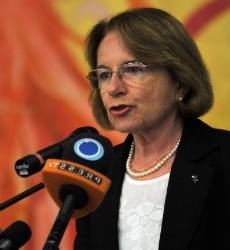
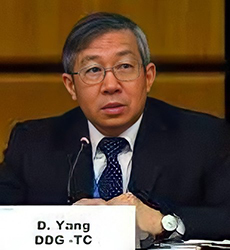
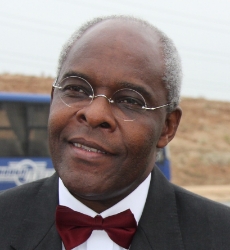
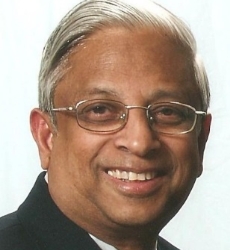
Dr. Carlito Aleta (1997-2003), Dr. Prinath Dias (2003-2010), Mr. Kesrat Sukasam (2011- 2013) functioned as RCA Coordinators / RCA Focal Persons during this period. In between the appointment of RCA Coordinators, the Section Head of former East Asia and Pacific Section, Dr. M.N. Razely (February – May 2003) served as the RCA Coordinator in an acting capacity. Dr. Manase Peter Salema (2002-2008) and Dr. Dazhu Yang (2009-2012) were the Directors of the TC Division for Asia and the Pacific. Dr. Ana Maria Cetto was the Deputy Director General and the Head of the Department of Technical Cooperation during this period.


